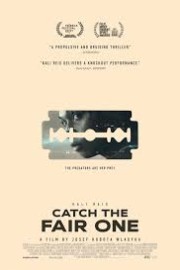Catch the Fair One
The issue of human trafficking has become more and more of a topic in society over the years. A couple of years ago, there was a documentary short about the issue, and how a lot of Native American tribes have seen an up-tick in young women being kidnapped and sold into labor, disappearing. “Catch the Fair One” looks at the issue from a personal perspective, but with an outsider’s eye. The result is not so much an exploration of it, but a look at one woman trying to fight back, and save a loved one. It’s a good thriller, and ultimately, leads to a strong idea.
Kaylee (Kali Reis, who co-wrote the story) is a former boxer haunting by a failure. Not in the ring, but away from it. Her sister was kidnapped by traffickers, and it shook her family to its core. Her mother has looked to grieve the loss through a support group for other people whom have had the same loss. She blames Kaylee, however, and that just piles more blame that she carries for herself. Kaylee hasn’t given up hope, though, as she wants to get her sister back. That’s a risky proposition, however; how far is she willing to go?
Josef Kubota Wladyka’s film follows with Kaylee’s perspective throughout, and it’s very much a genre film more than anything. We are looking at a story of rescue or revenge; she’s not someone looking to burn the whole thing down- although she’ll take it down gladly. She’s just wanting her sister back. If you’re looking for a more thoughtful look at the topic, seek out documentaries like “Blackfeet Boxing: Not Invisible,” which gives us facts and the emotional toll human trafficking, and general disregard for Native American tribes, has on the communities. This is a thriller in the “Taken” vein, although more rooted in a personal experience than mindless action.
Reis is a boxer in real life, so she’s more than adequate in what set pieces there are in the film. She also does a fine job as an actor, showing us the toll her guilt has on her, and the resolve she has to find her sister. It eventually brings her in front of the person in charge, and their answer chills you. Her response is the only rational one she could make. “Catch the Fair One” confronts a sad, uncomfortable truth- to some people, humanity is just a resource to be used, not to be cared about. For the rest of us who do care, it’s difficult not to understand why Kaylee does what she does. Life isn’t always fair, though; sometimes, we’re left wondering if our actions have meaning. If it’s for a purpose larger than us, “Catch the Fair One” argues in its own way that yes, they do, even if they no longer have meaning to us.










